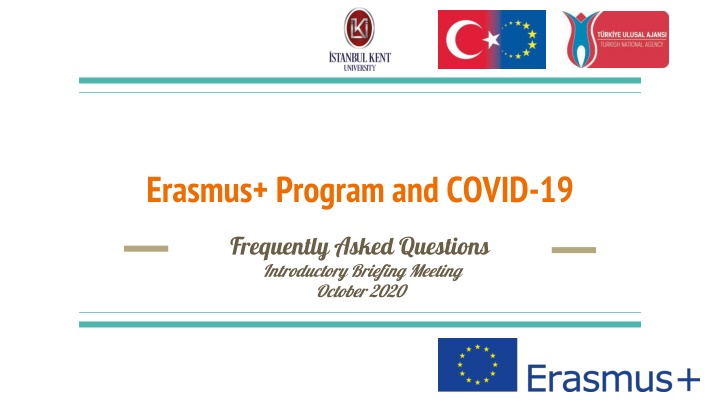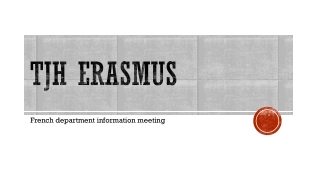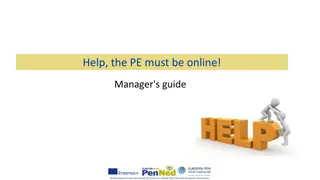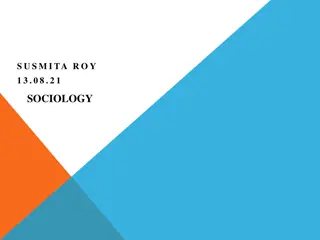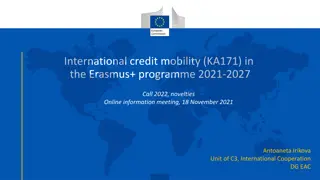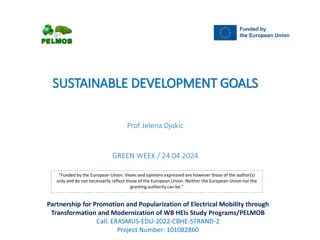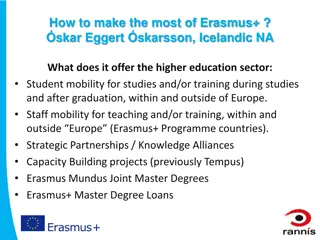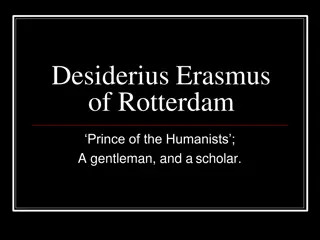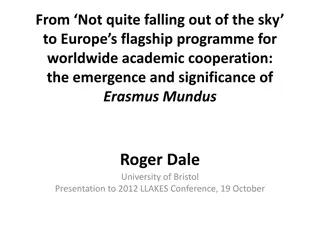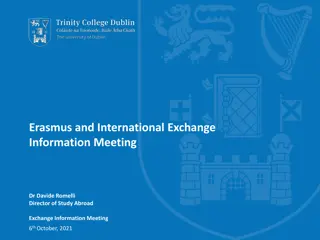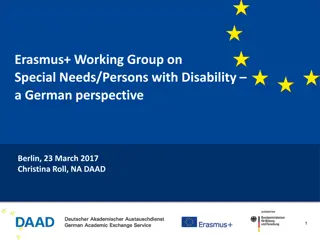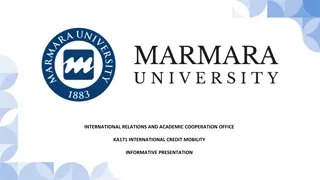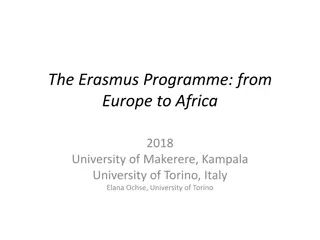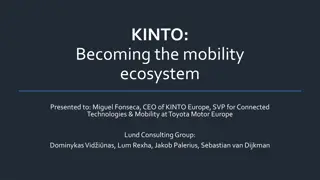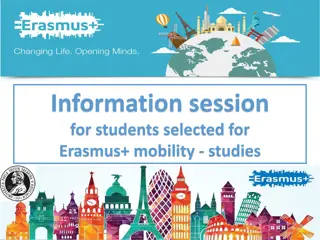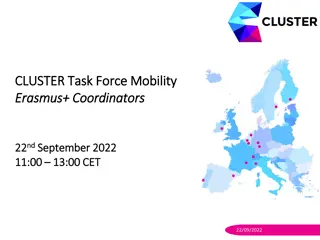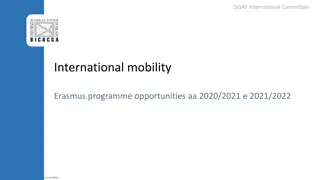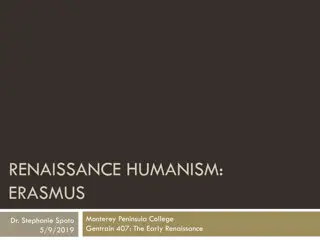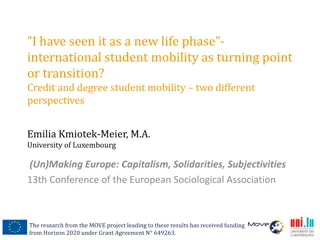Erasmus+ Program and COVID-19 Online Mobility Options
The Erasmus+ Program offers various online mobility options for learning amidst the COVID-19 pandemic. These options include virtual mobility where courses are taken online, hybrid mobility combining virtual and physical modules, and different types of mobility scenarios depending on pandemic conditions. The EU Commission supports online mobility for students and staff, allowing for flexibility in starting and completing mobility activities. Financial support varies based on the type of mobility chosen.
Download Presentation

Please find below an Image/Link to download the presentation.
The content on the website is provided AS IS for your information and personal use only. It may not be sold, licensed, or shared on other websites without obtaining consent from the author.If you encounter any issues during the download, it is possible that the publisher has removed the file from their server.
You are allowed to download the files provided on this website for personal or commercial use, subject to the condition that they are used lawfully. All files are the property of their respective owners.
The content on the website is provided AS IS for your information and personal use only. It may not be sold, licensed, or shared on other websites without obtaining consent from the author.
E N D
Presentation Transcript
Erasmus+ Program and COVID-19 Frequently Asked Questions Introductory Briefing Meeting October 2020
ONLINE MOBILITY FOR LEARNING TYPES OF ONLINE MOBILITY: Virtual (Online) Mobility: Courses are taken from a higher education institution abroad; at home (in Turkey) or in the country where the higher education institution is located (abroad); completely online. Hybrid Mobility: Virtual (Online) mobility and (ordinary) physical mobility modules can be combined in different ways. For example; - Mobility that begins online due to the pandemic (at home or abroad) can be turned into physical mobility if conditions allow. - Physical mobility can be performed online by staying abroad or returning home due to the pandemic.
ONLINE MOBILITY FOR LEARNING Beginning student/staff mobility online, continuing online and completing online according to the course of the global epidemic, have been deemed appropriate by the EU Commission pursuant to COVID-19 measures. Mobility Types: 1. It can start online and be completed physically. (Mixed Mobility = Virtual + Physical Mobility) 2. It can start online and finish online. (Virtual mobility - without traveling, at home) 3. It can be started physically and completed online according to the course of the pandemic. (Mixed Mobility) 4. Starting physically and completing physically. (Normal - Physical - Mobility) 5. Lessons are taken virtually in host country. (Virtual Mobility-Abroad)
ONLINE MOBILITY FOR LEARNING 1. It can start virtually and be completed physically. (Mixed Mobility = Virtual + Physical Mobility): Mobility begins at home without traveling, if conditions allow, it is completed abroad. During virtual mobility at home without travelling, individual grant is not received, while for physical mobility, the usual Individual Support Grant is given. 2. It can start online and finish online. (Virtual Mobility - without travelling, at home) : Individual Support Grant is not given. However, expenses incurred by the participant with the idea that mobility will be physically completed will be imbursed equally and fairly for all participants in the same situation, if the University's KA103 funding allows it.
ONLINE MOBILITY FOR LEARNING 3. It can start physically and be completed virtually according to the course of the pandemic. (Mixed Mobility) : Due to Covid-19, a force majeure circumstance, any expenditure regarding mobility may be reimbursed equally and fairly for all participants in the same situation, provided that it has become an irrevocable expenditure due to cancellation or postponement; provided that it is documented that it is not refundable, and if the KA103 funding of the University allows it. In addition, the physically performed part of the mobility is awarded grant normally. 4. Starting physically and completing physically. (Normal - Physical - Mobility): Regular Individual Support Grant is given. 5. Lessons are taken virtually in host country. (Virtual Mobility - Abroad): Regular Individual Support Grant is given.
SUMMARY In conclusion; Regardless of the type of mobility, whether online or physical, if you have traveled to host country where you will be a guest for mobility and have stayed there for a period of time, you will receive grant normally for your time in said country. If you have not traveled to host country where you will be a guest for mobility and have attended the courses of the host university online from Turkey / you have taught for the host university online from Turkey or you have trained virtually from Turkey; no grant is given.
WHY SHOULD I PARTICIPATE? If I can't travel to, live and/or travel in that country, and when I'm not traveling and I'm not physically in that country, the grant isn't given; why should I participate in online mobility? Firstly, you can also participate in online mobility as a guest in host country. In this case, you can both benefit from the usual Individual Support Grant and gain the experience of living/traveling in that country. Secondly; yes, if you do not go to host country as a guest and perform your mobility online from your home, you are not given the usual individual grant support and are deprived of the experience of living in another country and experiencing their culture, which is a very valuable output of Erasmus+ achievements. But still, online mobility without grants, which you can participate in from your own home, has many advantageous aspects compared to a local and ordinary university life.
WHY SHOULD I PARTICIPATE? When our students are involved in online mobility, even from their own homes and without grants; They get a European university experience that can be written on their CV, They take lessons from foreign teachers, They improve themselves in terms of foreign language and international academic competency, They attend multinational classes and have a chance to participate in international projects, They get the chance to network internationally, and They gain important experiences for master's degree / business life. When our personnel are involved in online mobility, even from their own homes and without grants; Our academic personnel experience teaching an international class, albeit virtually, Our administrative staff can experience and see how the office work of an International University functions and acquire significant professional achievements. In any case, opportunities for international Networking and research / professional collaborations can emerge.
WHY SHOULD I PARTICIPATE? As Erasmus+ and International Programs Office, we support and encourage all our valuable students / members to participate in virtual and mixed online mobility in a host country or from your own home, depending on the course of the pandemic, since they will contribute to personal, intercultural, academic and professional potential achievements.
WHAT IS FORCE MAJEURE? Force Majeure refers to the causes of consequences caused by conditions such as natural disaster, war, pandemic that occur beyond our control and affect both our activities and activities throughout the country and/or the world. The new Coronavirus covid - 19 global pandemic is a force majeure. During the pandemic, universities will try to cover the financial losses incurred by all participants from both students and staff due to covid-19 force majeure and directly related to Erasmus+mobility, to the extent permitted by their funding from Erasmus+ KA103 grants.
WHAT EXPENSES MADE DUE TO FORCE MAJEURE ARE COVERED FROM THE ERASMUS+ GRANT? If each expenditure related to mobility has become an irrevocable expenditure in character due to cancellation or postponment, payment is accepted, provided that it is documented that it cannot be refunded. In the event that, it cannot be documented that the refund is partially or completely impossible, a reimbursement can be made on condition that the participant receives a signed declaration that the refund is not possible and that the expense is related to mobility. Students' travel expenses (urgent return ticket or departure ticket if activity cannot start), rent or dormitory payment that they have invested and cannot be refunded and visa-insurance expenses can be covered. If a reimbursement is possible, it should not be in the form of a repayment of all costs incurred; it should be in the form of compensation for damage suffered after cancellation/postponement.
WHAT EXPENSES MADE DUE TO FORCE MAJEURE ARE COVERED FROM THE ERASMUS+ GRANT? Students can be paid more than the maximum grant set out in their initial agreement due to the Coronavirus pandemic which is a force majeure. In this case, an additional agreement is signed with the participant for the new amount. HIGHER EDUCATION INSTITUTIONS WILL USE EXISTING STUDENT/STAFF GRANTS TO COVER EXPENSES INCURRED UNDER FORCE MAJEURE. If these grants are not sufficient, the Institutional Support Funding can be used. Therefore, it is recommended that other expenditures within the scope of Institutional Support be minimized.
WHAT EXPENSES MADE DUE TO FORCE MAJEURE ARE COVERED FROM THE ERASMUS+ GRANT? Including institutional support grant, total available grant, which is allocated to the University, is not sufficient to cover the additional expenses due to covid-19; the university determines in writing a fair and transparent method that would meet the expenses of all students and staff (such as reimbursing only a certain percentage of the force majeure expenses of all students and personnel). It is aimed to minimize the negativity faced by participants due to situations such as returning home urgently, temporary suspension of education, inability to leave the country despite the end of the mobility activity; which they cannot predict and control.
WHAT EXPENSES MADE DUE TO FORCE MAJEURE ARE COVERED FROM THE ERASMUS+ GRANT? In any case, the amount that can be given to participants will be determined and evaluated within the University's own Erasmus+ funding, in a way not exceeding the amount of the grant for the relevant project period that the university has already signed with the National Agency of Turkey. A transparent and fair method should be determined and implemented by the Erasmus+ administration of the university, applying the same conditions, for all participants in the same situation, if the full costs of the participants cannot be covered.
WHAT EXPENSES MADE DUE TO FORCE MAJEURE ARE COVERED FROM THE ERASMUS+ GRANT? Late start or no start of mobility: Provided that it remains within the duration of the agreement period, late starting activities will be awarded grants in the usual way. If the activity cannot start and can not be carried out later: Students are reimbursed for expenses such as travelling, dormitory/rent, visa-insurance, etc., which were incurred with the expectation that the activity will be carried out and cannot be refunded. If the student applies for elections in later project periods, 10 point reduction is not applied.
WHAT EXPENSES MADE DUE TO FORCE MAJEURE ARE COVERED FROM THE ERASMUS+ GRANT? Beginning of the mobility, returning home due to the pandemic and terminaiton of mobility: In addition to the usual grant calculated according to the duration of the participant's stay; non- refundable travelling, dormitory/rent, and visa-insurance expenses are reimbursed. In accordance with the force majeure provisions, it is possible to perform the activity that was terminated during the same project period. Whether or not the activity will be repeated is decided by the University by evaluating factors such as number of affected activities/participants, agreement quotas, funding; for all participants in the same situation, with the condition of an equal, fair and transparent practice. Activities performed again are awarded grants normally. If the mobility activity cannot be performed again during the project period and the student participates in in-house selections during the subsequent project period, 10 point reduction is not applied.
WHAT EXPENSES MADE DUE TO FORCE MAJEURE ARE COVERED FROM THE ERASMUS+ GRANT? Beginning of the activity, interruption due to the epidemic and completion of online training: If the participant continues online training of the institution in which he/she is a guest during the period of activity, without returning from abroad, and completes his/her activity in this way; Entire period of activity abroad is awarded grant. In addition, additional costs such as travelling, visa-insurance, and accommodation are not paid. If the participant returns home and continues and completes the online education of the institution abroad; grant is awarded according to period of physical and physical-online activity. In addition, additional costs arising from non-refundable expenses or cancellation and urgent return, such as travelling, visa- insurance, accommodation expenses, can be reimbursed by signing an additional agreement. If the period of activity lasts longer than the period stipulated in the agreement; grant issuance according to the realized period can be made by an additional agreement, if the KA103 funding of the university allows it. In addition, additional expenses that cannot be refunded or caused by cancellation, such as additional travel, visa-insurance, and accommodation expenses, can also be reimbursed by signing an additional agreement if the KA103 funding allows it.
WHAT EXPENSES MADE DUE TO FORCE MAJEURE ARE COVERED FROM THE ERASMUS+ GRANT? In these three cases where the activity is completed, the participant is not automatically granted the right to participate in mobility again during the same project period. However, since mobility has been performed in exceptional circumstances, 10 point reduction is not applied if former participants participate in selections in later project periods. Starting mobility activity, interruption due to the pandemic, returning home, returning to host institution with the start of physical education and completion: Participants receive grant for the period when the education is suspended due to the epidemic; this interval is evaluated and awarded grant in accordance with the provisions of official public holidays. Any other grant is not given to the participant, except for the usual individual support grant.
WHAT EXPENSES MADE DUE TO FORCE MAJEURE ARE COVERED FROM THE ERASMUS+ GRANT? Start and completion of mobility activity, not being able to return home due to the suspension of international travelling: In the event that participants cannot return home due to the suspension of international travelling, the monthly Erasmus+ grant will continue to be paid for the period during which they cannot return home. Dates when international airfields and land fields are closed for transportation are followed by Erasmus+ Office and the accuracy of the participant's late return is determined. To determine the duration of active mobility activity in MT+ entries, the return date specified in the participation certificate is written. For the extra period of time, the passport return date is taken into account and this part of the grant is calculated manually and written in the EU Individual Support section. Also, if additional costs such as flight cancellation etc. arise for such reasons, these costs are covered within the KA103 funding of the University.
WHAT ARE VALID DOCUMENTS FOR FORCE MAJEURE DECLARATION? Valid documents for force majeure imbursements: documents indicating that the payment regarding the service was incurred, but even though the service wasn't provided, the refund for the paid service was not received, documents, which indicate that the fee is non refundable, received from the person or institution that provide service; reports in cases where official corporate documents cannot be issued, e-mail correspondence are considered valid/proving documents. In the event that, it cannot be documented that the refund is partially or completely impossible, it will be sufficient to obtain the participant's signed declaration that the refund is not possible.
In addition; It is possible to pay for the travel expenses for non-grant students to return to Turkey, with the condition that payment is in line with the principles of equality and transparency for all non-grant students. With grant / without grant activities can be extended at most until the end date of the project period to which they belong. If students and staff who have been selected but haven't participated in the activity due to covid-19 cannot participate in their activities by the end of the project period, their right is not transfered to the next project period. At the request of the higher education institution, the duration of the project can be extended up to a maximum of 12 months.
For more information... For any questions and more information about Erasmus+ Program, please; visit our office by making an appointment emailing erasmus@kent.edu.tr. Appointments can also be conducted online within the framework of measures to combat covid-19. We are always here for our dear students and members.
Thank you for listening... We can move on to the Q&A part.
